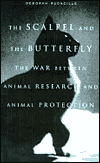Animal rights, human wrongs?
 For some people, experimentation with laboratory animals is a medical and scientific necessity. These animals - mice, rats, cats, pigs, dogs and others - are essential sacrifices made in the name of progress, knowledge and an improved human condition. But for others, animal testing of any kind is not only unnecessary, it is cruel and barbaric, the imposition of one species` bloody will upon everything else.
For some people, experimentation with laboratory animals is a medical and scientific necessity. These animals - mice, rats, cats, pigs, dogs and others - are essential sacrifices made in the name of progress, knowledge and an improved human condition. But for others, animal testing of any kind is not only unnecessary, it is cruel and barbaric, the imposition of one species` bloody will upon everything else. Few social controversies rouse greater passion than the debate between those who support animal research and those who would keep animals out of the laboratory. It is a conflict that has ebbed and flowed, occasionally flooding the popular imagination, for more than two centuries. It is unresolved. And in this emerging era of cloning, genetics and tissue transfers between species, it is likely to remain so.
Certainly, Deborah Rudacille, a former writer and editor at the Johns Hopkins Center for Alternatives to Animal Testing, offers no ready solution. But that is not her task here. Rather, she presents a reasoned and balanced history of the war still raging. It is a story filled with larger-than-life characters and ironies aplenty.
For example, among the hotbeds of anti-animal research was early 20th-century Germany. Vivisection (medical research, including surgery, on living animals) was banned in much of the country and severely restricted elsewhere.
"Germans worshipped nature as a beautiful whole and sought to understand her organically, holistically. The bond between humans and animals, who were part of the living soul of the land, was said to be sacred to all true Germans," writes Rudacille. The Nazis embraced this ideal, announcing in 1933 that persons found vivisecting animals of any kind would immediately be transported to concentration camps. (Of course, Nazi scientists and doctors would later commit heinous medical experiments upon Jews and other captives, twisting the ideals of science to their own means and elevating animals to a status they murderously denied fellow human beings.)
Animal rights advocates have traditionally had a tougher time of it in the United States than in Europe. Science in the States has long been viewed as generally beneficial to society. Still, the fight has been heated at times, with both sides sometimes engaging in hyperbole and hysteria.
In 1956, for example, the Animal Welfare Institute, a watchdog group, revealed that thousands of monkeys imported to various American labs were being transported inside atrociously overcrowded containers. Specifically: as many as 20 monkeys would be crammed inside crates just 17 inches high, with floor space 18 inches by 35 inches. Many of the animals did not leave these boxes alive. The AWI demanded better treatment for these animals, many of whom would ultimately die in the name of science.
The National Society for Medical Research responded by publicly accusing the AWI of hypocrisy and maliciousness akin to that practiced by Hitler and Stalin.
To be sure, animal rights activists have been guilty of the same sort of overkill. In the 1980s, their movement cloaked in the jargon of a moral crusade, some activists took to vandalizing laboratories, indiscriminately freeing animals and destroying scientific equipment and records. Frequently, there was no evidence that the scientists victimized had been guilty of any sort of animal mistreatment - only that they had used animals in their research.
Activists defended their acts by claiming the scientists were guilty of "speciesism," the oppression of one species over others. It was, they argued, a behavior no less evil than racism or other forms of discrimination.
New laws and evolved sensitivities have blunted some of the old complaints about animals in labs, but the conflict, Rudacille notes, continues to percolate. There are fundamental concepts still at odds, still to be reconciled.
Scientists hold that humans are part of a long, evolutionary chain that binds all species together and yet, at the same time, they argue it is ethically permissible to experiment with animals because they are in some way different (and lesser) than humans.
Animal protectionists armor themselves with two separate, opposed sets of beliefs. In the first, they agree with scientists that humans are a kind of animal, one among many, with no special rights or privileges. In the second, they propose that humans and animals differ in some essential characteristic forever beyond the scientific gaze.
Accommodating all of these viewpoints in a manner satisfactory to everyone seems to be an experiment in the impossible.
- Scott LaFee
(c) Copley News Service
advertisement

Author: Scott LaFee
Archives
Funny Girl on Stage Tonight
Singing and Science in South Jersey
Visions From Around the World
All the Spring`s a Stage at CCC
An Entertaining Threat in SJ
Free Theatre Tickets for Young People
Free Theatre Tickets for Young People
Suzanne`s Diary for Nicholas
Hostage
The Final Season - Fathers, Sons and One Last Season in a Classic Ballpark
A Different Drummer
Glory Denied
The Cold Six Thousand
Poker: Bets, Bluffs and Bad Beats
A Primate`s Memoir
More Articles







